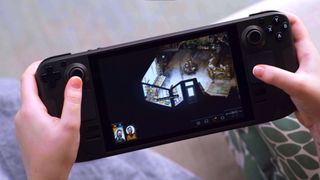Developers praise the Steam Deck: 'It just works, for real'
We spoke to several developers with Steam Deck dev kits and they're all impressed.

The Steam Deck may finally be shipping out in a few weeks to those who preordered it, but game developers have had an early version for months. They've been teasing us by posting clips on social media showcasing Valve's handheld gaming PC running their games. We spoke to several of these developers and they all assert that, yes, the excitement is genuine, and the Steam Deck could be huge for PC gaming.
All of the developers we spoke with were shocked at how easy it is to work with the Steam Deck, despite the system running Linux and Proton, a Windows compatibility layer on top of it.
"I was surprised how well games work on it without any changes, and how good it feels to play on it," Jonathan Smårs, Iron Gate programmer and designer, told PC Gamer. "Valheim worked from day one on Steam Deck without any changes," he said.
"The graphic settings need to be set down a bit compared to my high end PC of course, but I'm still impressed with what such a small handheld can handle without any platform specific optimizations," Smårs said.
@Valheimgame is ready for the Steam Deck from @valvesoftware! It's a very impressive piece of machinery. I'm looking forward to the release and playing Valheim on the go with my friends! @Steam @OnDeck pic.twitter.com/vX8KcR7arCJanuary 24, 2022
A few developers we talked to explained that they had to make minor adjustments to their games, like detecting the right screen resolution and smoothing out controller support. But every issue was either the fault of the game or something easily fixable with some tweaks.
"I did have some issues with controls, but my game is not designed for a controller at all, it doesn't even have the code to detect/respond to controller inputs," Raymond Doerr, owner of SixtyGig Games and developer of Rise to Ruins, told us.
"The touchpad for the mouse, I dare say, might be one of the best I've ever used. I'll need to design a controller layout for it, as well as write controller support for the game, but I suspect my game will be playable on it when that's done," he said.
PC Gamer Newsletter
Sign up to get the best content of the week, and great gaming deals, as picked by the editors.
Valve seems to be doing everything in its power to make the process of porting games to its handheld as simple as possible. Last year, it said that it would define any reason a game doesn't work on the Steam Deck as a bug, and that it wants the entire Steam library to be playable on it. When anti-cheat implementation threatened the availability of major games on it, Valve went and quickly fixed it. For any other issues, developers told us, they haven't had to contact Valve at all.
"[Valve is] working really hard and it shows."
Most of the developers we spoke to agreed to an NDA with Valve and were unable to speak to specifics about the Steam Deck OS and how other games run on it, but many of them said they're confident it'll be a smooth launch in terms of its software. One developer who extensively tested other games as well as their own told us that the OS might have some issues on the development side, but for everyone else, it should be fine. They explained how some games struggled to detect the Steam Deck as a controller and that the Steam library can be a pain to scroll through without a search function or a way to collapse the list.

"The issues I'm encountering feel like 'dev build' sort of issues so they've not really bothered me," the developer said. "I get firmware updates fairly regularly, they're working really hard and it shows."
Mike Rose, company director of No More Robots, echoed their statement: "The Steam OS feels like it always has—90% great. You know when you use Steam Big Picture and it's a bit like, this is nearly great, but it just has little niggles here and there—that's how Steam Deck feels."
Looking forward, the big question is how much support Valve will give to the Steam Deck. The company has released hardware before, like the Steam controller and Steam Machines, but they're often abandoned after a few years.
"I am a bit worried about support, I've had a Steam controller, Steam Link, HTC Vive, and a Valve Index, and two of the four are pretty much discontinued," Raymond Qian, project manager and CTO for Sekai Project, said.
That said, Qian has hope that it'll last. "Since there's very little work required on the developer's side, I think as long as Proton is maintained the Deck will continue to be up to date for the latest games," he said.
News of AMD's FidelityFX Super Resolution upscaling tech coming to the Steam Deck should help with that too. Even if a game technically works on the Steam Deck, that doesn't mean it'll be realistic to play it, especially if it's taxing to the handheld's integrated AMD graphics chip. With AMD's tech, you'll be able to upscale games to the device's 1280 x 800 resolution at a higher frame rate than you would without it. If it works, and games continue to support it, the Steam Deck could be around for a while in its current iteration.
We'll know soon. On February 28, the Steam Deck units start to ship out, and we'll finally start to see how big of an impact Valve's latest release will make, and get a better picture of how long it'll last. The list of Steam Deck verified games is starting to populate. Popular games like Sekiro work fine, but Subnautica and The Witcher 3 are only marked as playable (with some limitations) because of issues with text readability and lack of cross-platform saves. According to the developers we talked to, these are the sorts of small issues that should be worked out very soon. Like a console launch, there's going to be hiccups, but hopefully they'll be sorted out and we can get a sense of where the Steam Deck fits into PC gaming.
Tyler has covered games, games culture, and hardware for over a decade before joining PC Gamer as Associate Editor. He's done in-depth reporting on communities and games as well as criticism for sites like Polygon, Wired, and Waypoint. He's interested in the weird and the fascinating when it comes to games, spending time probing for stories and talking to the people involved. Tyler loves sinking into games like Final Fantasy 14, Overwatch, and Dark Souls to see what makes them tick and pluck out the parts worth talking about. His goal is to talk about games the way they are: broken, beautiful, and bizarre.
Most Popular


